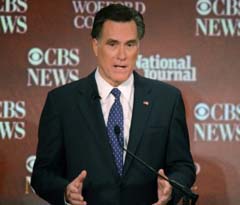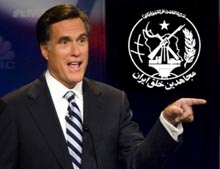Hereinafter, what the MeK puts on agenda is stimulating West to increase economic pressure and set off an all-out political war against Iran. This is the reason behind the group’s campaign in the US in favor of Mitt Romney or their effort to trace the companies who deal with Iran or some European countries’ trading with this country in order to put them under pressure to cut off these exchanges.
The MeK removal from the US list of Foreign Terrorist Organizations has determinant role in future direction of the group.
The US motivations for delisting of the MeK and providing conditions for this terrorist group to conduct free political – commercial activities is a topic that should be investigated separately, but, to put briefly, one can say that the US has placed them at the beginning of a path that if proceeds as it is designed, then America can employ them in feuding over Iran.
The MeK strategy shift
As the consequence of getting out of the terrorist list, The MeK needs to shift its strategy for confronting the Islamic Republic and pursue this goal with a different program and mechanism.
The fact is that the strategy of "fall through armed struggle", which the MeK past three decades has persuaded it through tactics of large operations, urban warfare and terror, alignment with Saddam in the war against Iran, and even triggering a military invasion by the US and the Zionist Regime to Iran, is totally defeated and will never find a chance to reoccur. Public emergence of Masood Rajavi (something that sooner or later will happen) and likely congratulations on his gang’s delisting, really is official announcement of this failure.
Then what happens?
Hereinafter, what the MeK puts on agenda is stimulating West to increase economic pressure and set off an all-out political war against Iran. This is the reason behind the group’s campaign in the US in favor of Mitt Romney or their effort to trace the companies who deal with Iran or some European countries’ trading with this country in order to put them under pressure to cut off these exchanges.
Effort to put "immediate Regime Change" on the US agenda and shifting policy from investment on domestic opponents toward the opposition abroad is among the changes in the MeK strategy. overall viewing, one can account that this shift will approximate the MeK to western countries. But the gap is much larger than it looks.
In this regard, we should notice that the US and European countries are focused on Iran’s internal developments and managing it to their benefits and so- called gradual decay from within; this means complete elimination of the opposition abroad.
About the opposition abroad, Rajavi probably offer suggestions concerning alliance and coalition with Iranian opposition groups that merely could lead to theoretical arguments and reactions, because, given the MeK’s ideology and record, It is unlikely that they be willing to attend in Joint meetings and negotiate with the others.
It is very important issue that the MeK are suffered from inversion of thinking and view. The most effects of this inversion are represented in their analysis of situation inside Iran and of Iranian people, the capabilities of Iranian government, their own organizational capabilities, and their misunderstanding of Western policy. Of course, the MeK’s leadership neither is able to understand this fact, nor he would accept it. So, he draws his gang on a Path of no return.



